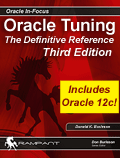| |
 |
|
Oracle Schema Components
Oracle Database Tips by Donald Burleson |
Question:
This may be a very dummy question, but I'm new
to Oracle (I'm used to MySQL / PostgreSQL, an others) but Oracle
Users / Tablespaces are just driving me crazy.
I have two WEB applications. They have some tables with the
same names (t_adm_user, t_adm_crashreport, etc). I connect to an
Oracle database (only one instance if I'm understanding well the
concepts) with two different users.
When I run the first app (connecting as CDI_USER), the framework I
use (Hibernate) creates the tables for the first app (Including the
tables with common names) and then, when I run the second app
(connecting as ONT_USER) the framework creates the tables for the
second app but tells me that tables with common names are already
created.
I would like to be able to have to two different "schemas or
namespaces" (Here is where Oracle terminology gets me confused) for
each app, so no matter if they have some tables with common names,
they don't get shared. Is there any way?
Answer:
It's fairly easy to remember the relationships
between Oracle schema components once you can visualize the
architecture. Here are some simple concepts:
-
A "database" component can be thought-of as
a set of xxx.dbf files
-
An "instance" component is a running set of
programs that read the .dbf files (Oracle RAC allows many
instances to connect to the database).
-
An "object" components is a table, index,
cluster table, &c
-
The "user" component creates objects as the
"schema owner" of those objects.
-
The "synonym" component allows you to
"alias" an object to make the schema owner hidden:
create synonym food for
cat.food;
-
With "public
synonym" components, the table owner name ("the user ID") is
kept inside the synonym definition and appended to the table
name at runtime to remove duplicates:
create public synonym
food for cat.food;
-
Here are
details on
Oracle File & Tablespace Management
Within a database we have schemas, each owned
by a specific user_id. Hence, we can think of a USER and a OWNER as
the same in the sense that a schema owner is a single, distinct user
ID:
schema_owner = user_id
Also, we can refer to tables with their "fully-qualified" names,
where we include the schema owner. Here we see two tables named
"food", one created by the user "cat" and the other schema owner
"dog":
select
stuff from cat.food;
union
select stuff from dog.food;
Finally, Oracle has Optimal Flexible
Architecture (OFA)
naming conventions for all Oracle schema components including
data files, tablespaces, users (schema owners), tables, and so on.
 |
If you like Oracle tuning, you may enjoy my new book "Oracle
Tuning: The Definitive Reference", over 900 pages
of BC's favorite tuning tips & scripts.
You can buy it direct from the publisher for 30%-off and get
instant access to the code depot of Oracle tuning scripts. |
|
